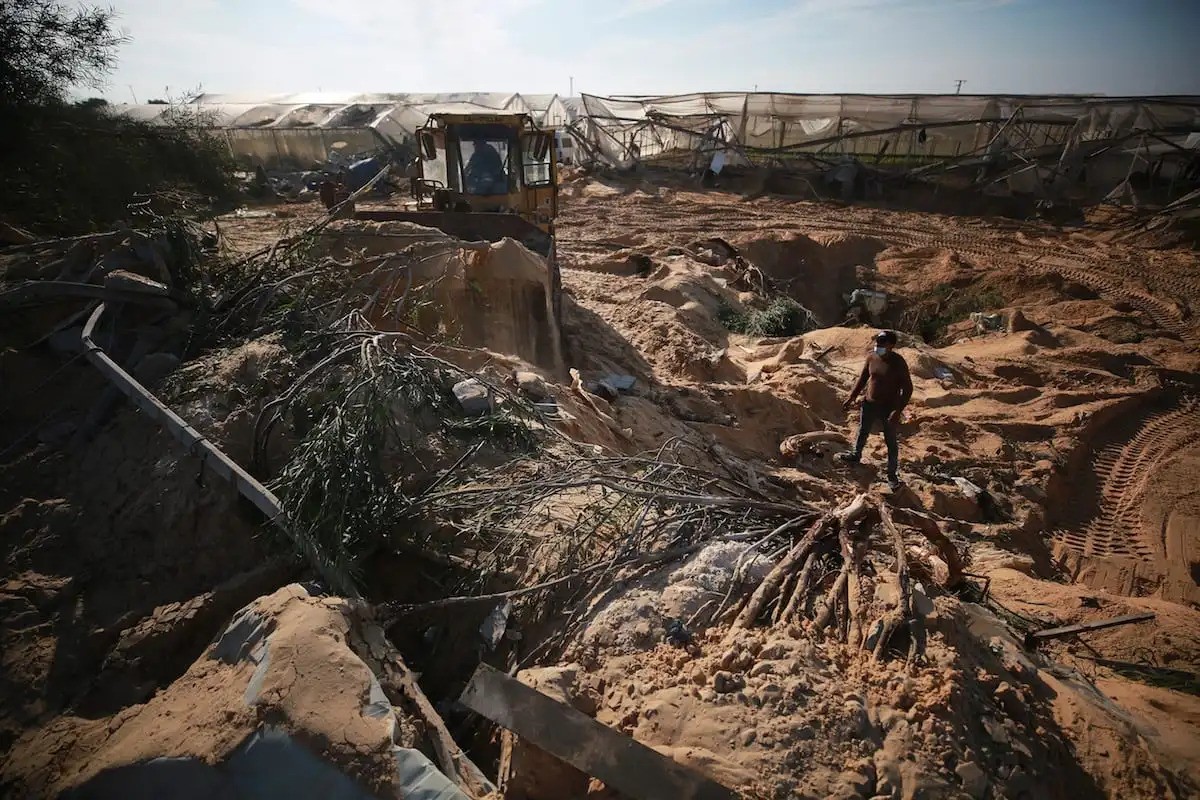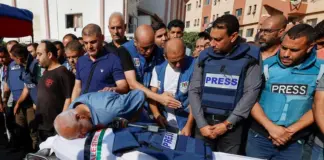By Sally Ibrahim,
Gaza’s livestock sector has also been severely affected, with nearly 2,500 chicken farms destroyed and over 36 million chickens killed.
The once-fertile agricultural lands of the Gaza Strip, especially along the eastern border, have been reduced to barren wastelands, ravaged by the ongoing Israeli military operations. Fields and greenhouses, once teeming with life, have been destroyed, pushing Gaza’s agricultural sector to the brink of collapse, according to Palestinian farmers and officials.
Since the outbreak of its genocidal war on 7 October 2023, Israel has been accused of deliberately targeting Gaza’s agricultural infrastructure as part of a broader strategy to deepen the humanitarian crisis in the besieged enclave, which is home to over two million people.
Local experts and officials warn that Israel’s destruction of Gaza’s agriculture has significantly worsened the ongoing food security crisis, leaving millions in peril.
Palestinian official estimates suggest that over 90 percent of Gaza’s agricultural land is now “unusable”, as farmers are unable to access their land due to Israeli attacks, compounding the already dire situation regarding food availability for the population.
“The Israeli military operations have decimated approximately 167,000 dunams of agricultural land, including 78,000 dunams of vegetables, 14,000 dunams of field crops, and 75,000 dunams of fruit trees,” Mohammed Abu Ouda, the spokesperson of the agricultural ministry, told The New Arab.
“More than 45 percent of Gaza’s agricultural land has been either partially or completely destroyed, leaving local farmers struggling to recover,” he said.
“Before the war, Gaza produced about 25 different types of crops, providing a degree of self-sufficiency,” Abu Ouda added. “Now, with most of our land lost and imports blocked, it has become nearly impossible to meet the basic food needs of the population.”
Salvaging what is left
Farmers across Gaza have described the devastating impact the war has had on their livelihoods. Mohammed al-Madhoun, a farmer from Shujaiya in eastern Gaza, shared the heartbreaking story of how his fields, once filled with tomatoes, cucumbers, and potatoes, now lie in ruins.
“We try to salvage what is left, but we are shot at if we get too close,” he complained to TNA, his eyes fixed on the charred earth. “Before the war, I had my own profession that helped me keep my eight-member family afloat. But now, everything has changed, and my life has turned upside down.”
“If I stay without working, it means that we will die of starvation […] If I go to my land, it means that I will be killed,” the farmer added. “Israel is deliberately pushing us to hell either through killing us or even through implementing its plans of destroying food security and our agricultural lands.”
In the northern Gaza town of Jabalia, Samer al-Bardawil faces similar challenges and risks.
“Every day is a struggle. We risk our lives by visiting our land because the choice is clear: either risk everything for a future, or accept hunger as our fate,” the 55-year-old father of nine told TNA, his voice filled with desperation.
The impact of Israel’s destruction extends beyond the agricultural sector. Gaza’s livestock sector has also been severely affected, with nearly 2,500 chicken farms destroyed and over 36 million chickens killed, including 850,000 laying hens, according to the agricultural ministry.
The sector has also lost cows and sheep, further exacerbating food insecurity in the region, the ministry said in a press statement.
“We have lost everything,” said Adel Shaath, a livestock breeder from eastern Gaza, recounting the destruction of his farm. “All the animals died because we couldn’t reach them with food or water during the bombings.”
“As Gaza’s agricultural and livestock sector crumbles, so does the hope for self-sufficiency,” Mohammed al-Wahidi, a Gaza-based economic expert, told TNA.
He said, “Gaza’s remaining productive agricultural land, just around 15,000 dunams, primarily in the western areas of Khan Yunis and al-Zawaida, is insufficient to meet the population’s basic needs.”
“The Israeli tightened blockade will never, at least in the near future, allow the Palestinians to revive their agricultural sector and have any opportunity to produce their food by themselves,” he added.
Hunger deepens
The destruction of Gaza’s agriculture has contributed to a worsening hunger crisis. As food prices soar and basic goods become scarce, thousands of families are forced to rely on aid organisations and charity kitchens for survival.
Mahmoud Hassanein, a volunteer at the al-Rahma charitable kitchen in western Gaza City, remarked on the increasing demand for assistance since the war started.
“At the beginning of the war, we assisted around 400 families each day. Now, that figure has risen to more than 9,500. People are having difficulty locating a loaf of bread,” he told TNA.
Suha Murtaja, a mother of five, stood in line at the charity, waiting for her turn to receive a meal. “My husband lost his job on the farm. We have no income, and sometimes we don’t even get the meal we depend on. It’s lentils or rice, and that’s barely enough,” Murtaja told TNA.
“We used to live with dignity, now we beg for food. I never imagined I’d find myself in this situation,” she added.
The ongoing blockade and the recent closure of the Kerem Shalom crossing on 2 March have worsened Gaza’s already dire situation.
With Kerem Shalom being the primary commercial crossing for goods, including food and medical supplies, its closure has made it virtually impossible for essential goods to enter the Gaza Strip.
“The blockade, now intensified by the closure of the crossing, is suffocating Gaza’s already fragile economy,” Mohammed Abu Jayyab, an economic expert based in Gaza, told TNA.
“The few remaining supply routes are insufficient to meet the overwhelming needs of the population, exacerbating the food security crisis,” he said.
The United Nations Relief and Works Agency (UNRWA) expressed grave concerns over the worsening situation. “The ongoing military operations have further exacerbated Gaza’s already dire food insecurity, leaving over two million people in need of urgent humanitarian assistance,” UNRWA said in a press statement.
The World Food Programme (WFP) also highlighted the growing crisis, noting, “WFP has been working tirelessly to address the hunger crisis in Gaza, but the Israeli blockade and closure have made it increasingly difficult to meet the needs of the population.”
Source: https://israelpalestinenews.org
Disclaimer: We at Prepare for Change (PFC) bring you information that is not offered by the mainstream news, and therefore may seem controversial. The opinions, views, statements, and/or information we present are not necessarily promoted, endorsed, espoused, or agreed to by Prepare for Change, its leadership Council, members, those who work with PFC, or those who read its content. However, they are hopefully provocative. Please use discernment! Use logical thinking, your own intuition and your own connection with Source, Spirit and Natural Laws to help you determine what is true and what is not. By sharing information and seeding dialogue, it is our goal to raise consciousness and awareness of higher truths to free us from enslavement of the matrix in this material realm.
 EN
EN FR
FR



























The Gazans could be you or me. Do I see 100,000 Jewish babies murdered? Do I see 500K Jews dead? Do I see a Israel that is in rubbles and ruins? What happened to an eye for an eye? Do Gazans use 2000lbs bombs on F35 fighters to "take out" "suspected 2 year old Israeli terrorist's"? How is it that the world allows a 10000 times greater response than called for? Because if you speak you are targeted. Like moi, for speaking against genocide am banned forever from YouTube with no appeal. Others literally murdered to silence. Be silent and let the universe know you support such terrorism & genocide. Better death than such dishonor!
USA face of Zionist terrorism and the darker rebirth of Kahanism
https://vtforeignpolicy.com/2025/04/betar-us-americas-new-face-of-zionist-terrorism-and-the-darker-rebirth-of-kahanism/
ISRAEL ON FIRE (video)! IRAN REVENGE FOR THE PORT MASSACRE
https://vtforeignpolicy.com/2025/05/israel-on-fire-iran-revenge-for-the-port-massacre-as-we-predicted-24-hours-ago/
State of Terror, How Terrorism Created Modern Israel – Thomas Suarez free PDF
https://ia802800.us.archive.org/21/items/stateofterrorhowterrorismcreatedmodernisraelthomassuarez/State%20of%20Terror%2C%20How%20Terrorism%20Created%20Modern%20Israel%20-%20Thomas%20Suarez.pdf